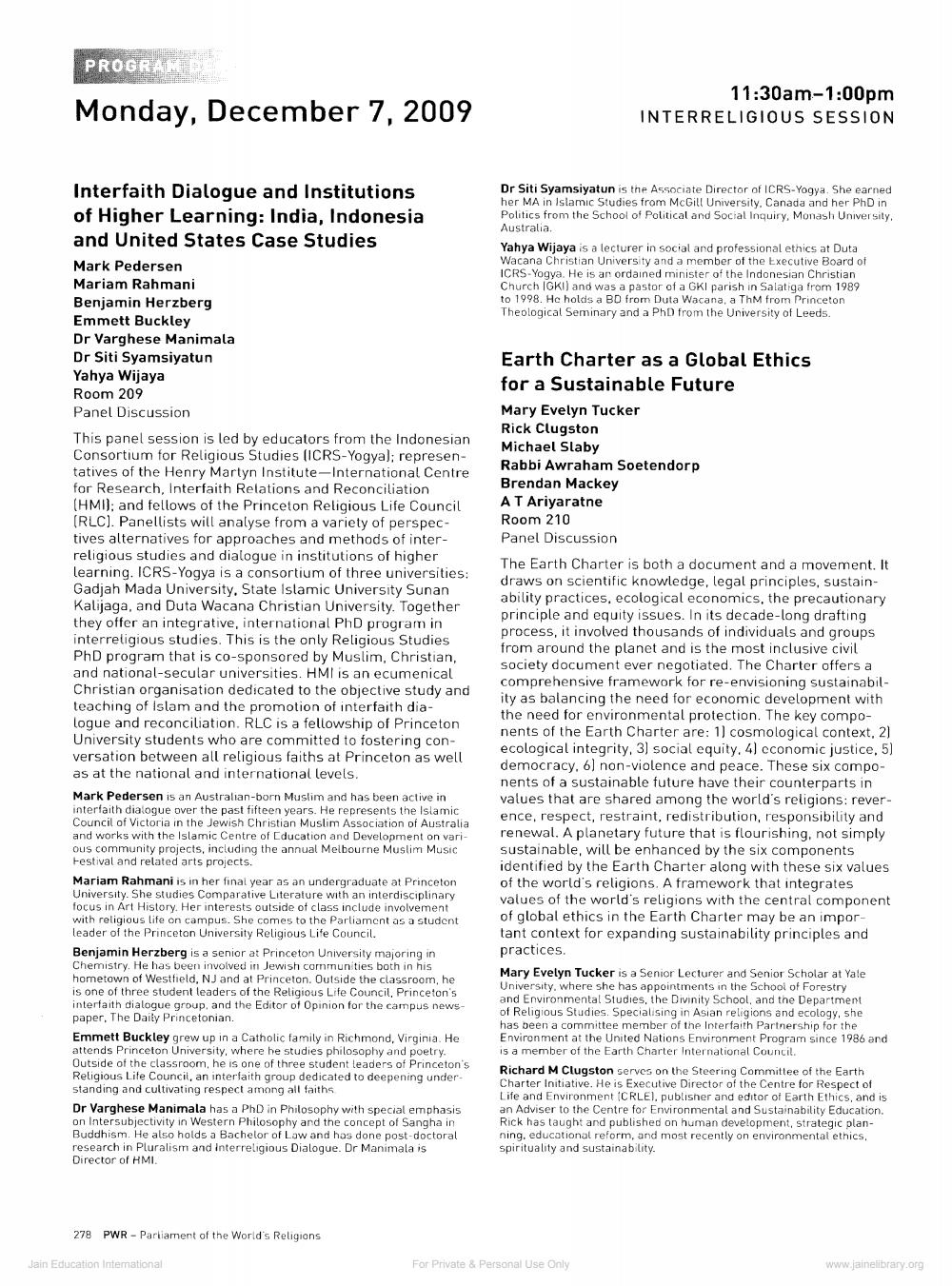________________
PROGRAM
Monday, December 7, 2009
11:30am-1:00pm INTERRELIGIOUS SESSION
Dr Siti Syamsiyatun is the Associate Director of ICRS-Yogya. She earned her MA in Islamic Studies from McGill University, Canada and her PhD in Politics from the School of Political and Social Inquiry, Monash University, Australia Yahya Wijaya is a lecturer in social and professional ethics at Duta Wacana Christian University and a member of the Executive Board of ICRS-Yogya. He is an ordained minister of the Indonesian Christian Church (GKI) and was a pastor of a GKI parish in Salatiga from 1989 to 1998. He holds a BD from Duta Wacana, a ThM from Princeton Theological Seminary and a PhD from the University of Leeds.
Interfaith Dialogue and Institutions of Higher Learning: India, Indonesia and United States Case Studies Mark Pedersen Mariam Rahmani Benjamin Herzberg Emmett Buckley Dr Varghese Manimala Dr Siti Syamsiyatun Yahya Wijaya Room 209 Panel Discussion This panel session is led by educators from the Indonesian Consortium for Religious Studies (ICRS-Yogya); representatives of the Henry Martyn Institute-International Centre for Research, Interfaith Relations and Reconciliation (HMI); and fellows of the Princeton Religious Life Council (RLC). Panellists will analyse from a variety of perspectives alternatives for approaches and methods of interreligious studies and dialogue in institutions of higher learning. ICRS-Yogya is a consortium of three universities: Gadjah Mada University, State Islamic University Sunan Kalijaga, and Duta Wacana Christian University. Together they offer an integrative, international PhD program in interreligious studies. This is the only Religious Studies PhD program that is co-sponsored by Muslim, Christian, and national-secular universities. HMI is an ecumenical Christian organisation dedicated to the objective study and teaching of Islam and the promotion of interfaith dialogue and reconciliation. RLC is a fellowship of Princeton University students who are committed to fostering conversation between all religious faiths at Princeton as well as at the national and international levels. Mark Pedersen is an Australian-born Muslim and has been active in interfaith dialogue over the past fifteen years. He represents the Islamic Council of Victoria in the Jewish Christian Muslim Association of Australia and works with the Islamic Centre of Education and Development on various community projects, including the annual Melbourne Muslim Music Festival and related arts projects. Mariam Rahmani is in her final year as an undergraduate at Princeton University. She studies Comparative Literature with an interdisciplinary focus in Art History. Her interests outside of class include involvement with religious life on campus. She comes to the Parliament as a student leader of the Princeton University Religious Life Council. Benjamin Herzberg is a senior at Princeton University majoring in Chemistry. He has been involved in Jewish communities both in his hometown of Westfield, NJ and at Princeton. Outside the classroom, he is one of three student leaders of the Religious Life Council, Princeton's interfaith dialogue group, and the Editor of Opinion for the campus newspaper. The Daily Princetonian. Emmett Buckley grew up in a Catholic family in Richmond, Virginia. He attends Princeton University, where he studies philosophy and poetry. Outside of the classroom, he is one of three student leaders of Princeton's Religious Life Council, an interfaith group dedicated to deepening understanding and cultivating respect among all faiths Dr Varghese Manimala has a PhD in Philosophy with special emphasis on Intersubjectivity in Western Philosophy and the concept of Sangha in Buddhism. He also holds a Bachelor of Law and has done post-doctoral research in Pluralism and Interreligious Dialogue. Dr Manimala is Director of HMI
Earth Charter as a Global Ethics for a Sustainable Future Mary Evelyn Tucker Rick Clugston Michael Slaby Rabbi Awraham Soetendorp Brendan Mackey AT Ariyaratne Room 210 Panel Discussion The Earth Charter is both a document and a movement. It draws on scientific knowledge, legal principles, sustainability practices, ecological economics, the precautionary principle and equity issues. In its decade-long drafting process, it involved thousands of individuals and groups from around the planet and is the most inclusive civil society document ever negotiated. The Charter offers a comprehensive framework for re-envisioning sustainability as balancing the need for economic development with the need for environmental protection. The key components of the Earth Charter are: 1) cosmological context, 2) ecological integrity, 3) social equity, 41 cconomic justice. 5) democracy, 6) non-violence and peace. These six components of a sustainable future have their counterparts in values that are shared among the world's religions: reverence, respect, restraint, redistribution, responsibility and renewal. A planetary future that is flourishing, not simply sustainable, will be enhanced by the six components identified by the Earth Charter along with these six values of the world's religions. A framework that integrates values of the world's religions with the central component of global ethics in the Earth Charter may be an important context for expanding sustainability principles and practices. Mary Evelyn Tucker is a Senior Lecturer and Senior Scholar at Yale University, where she has appointments in the School of Forestry and Environmental Studies, the Divinity School, and the Department of Religious Studies. Specialising in Asian religions and ecology, she has been a committee member of the Interfaith Partnership for the Environment at the United Nations Environment Program since 1986 and is a member of the Earth Charter International Council Richard M Clugston serves on the Steering Committee of the Earth Charter Initiative. He is Executive Director of the Centre for Respect of Life and Environment (CRLE), publisher and editor of Earth Ethics, and is an Adviser to the Centre for Environmental and Sustainability Education. Rick has taught and published on human development, Strategic planning, educational reform, and most recently on environmental ethics, Spirituality and sustainability.
278 PWR - Parliament of the World's Religions
Jain Education Interational
For Private & Personal Use Only
www.jainelibrary.org




